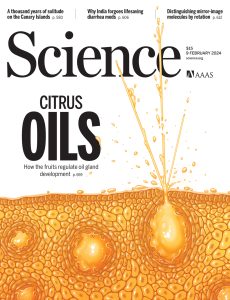
Science Magazine 9 February 2024 Issue
English | 140 pages | pdf | 58.2 MB
The world is continuously being transformed by science and technology (S&T), but to deliver equitable benefits to the public, scientists must be embedded in influential sectors of society—policy, diplomacy, journalism, law, business, education, and more. This means injecting PhD-level experts at every stage of research and development, from
ideation, investigation, and investment to manufacture, deployment, regulation, and after-market evaluation.
At first glance, it seems unlikely that scientists would be welcome outside of science itself. Trust in science was severely politicized and eroded during the pandemic, so why would scientists be invited into nonscience spheres of influence? Moreover, familiarizing graduate students with “nonresearch” pursuits and demonstrating how they can apply their skills to ensure that S&T addresses societal challenges are not standard in PhD science curricula.
Although trust in science has declined in the United States, trust in scientists has not. A S&T Action Committee survey comprising 48% Republicans, 38% Democrats, and 13% Independent Americans showed that nearly 80% of respondents across political affiliations found politicization and distrust of science to be concerning, and 80% wanted scientists to contribute more to shaping public policy. In fact, The Pew Research Center found that public confidence in scientists increased in the US, from 76 to 87%, during the pandemic. Why? Perhaps, as O’Connor and Weatherall suggest in The Misinformation Age, it is because the public accords scientists broad trust as experts in evidence-based deliberations and finding solutions to complex problems.
Scientists generally know little about the nonscience parts of governance, communication, and the economic and procedural systems that affect whether and how science discoveries advance through development and into the public domain. Here, academia, funding agencies, and professional societies and foundations bear crucial responsibility. Organizations that fund research and training should require that universities provide substantial career exploration courses to graduate trainees. Optional 1-day anecdotal presentations are insufficient, and deferring such offerings to the postdoc stage is too late. In parallel, professional societies and advocacy organizations should offer internships or fellowships that place newly minted science PhDs into influential outside-of-science environments.
Such programs do work. For example, in 2014, the US National Institutes of Health awarded pilot grants to 17 universities to devise training programs aimed at furnishing graduate trainees with working knowledge of careers in which their scientific expertise would bring great value. The University of California, San Francisco, created Motivating Informed Decisions, three 4-hour workshops followed by a dozen biweekly “peer mentoring” meetings, in which each member of six- to eight-person teams defines and progressively interrogates potential career goals. Together with the university’s Internships for Career Exploration program, which supports 10-week internships in diverse career settings, graduate students have reported confidence in embarking on diverse career paths. Some internship hosts were so impressed by the participating students that they offered their interns jobs.
Another example is the 50-yearold Science and Technology Policy Fellows program of the American Association for the Advancement of Science (AAAS, the publisher of Science Magazine). Members of Congress and heads of federal agencies bolster their staffs with these PhD fellows, and the outcomes speak for themselves: Among 4000 graduates of this program, 50% remained in policy, 25% returned to science careers, and 25% moved to other fields. Several states have now established similar programs to populate state government offices with scientists.
Clearly, the need for supporting career exploration is not limited to the US. Royal Society programs in the United Kingdom, for example, provide senior researchers and their graduate students and postdocs opportunities to learn about, and contribute to, law and the judiciary, business, management, finance, insurance, and other disciplines. Globally, we’re blessed with a robust cohort of talented S&T doctoral trainees who go on to make breakthrough contributions in academia or the private sector. But in today’s complex world, we also need scientists resolving problems and rendering decisions across society to ensure that S&T adds value to lives and livelihoods, sustains a safe environment, and contributes to security and economic well-being for all. We must illuminate those career pathways for all trainees.
Download from: